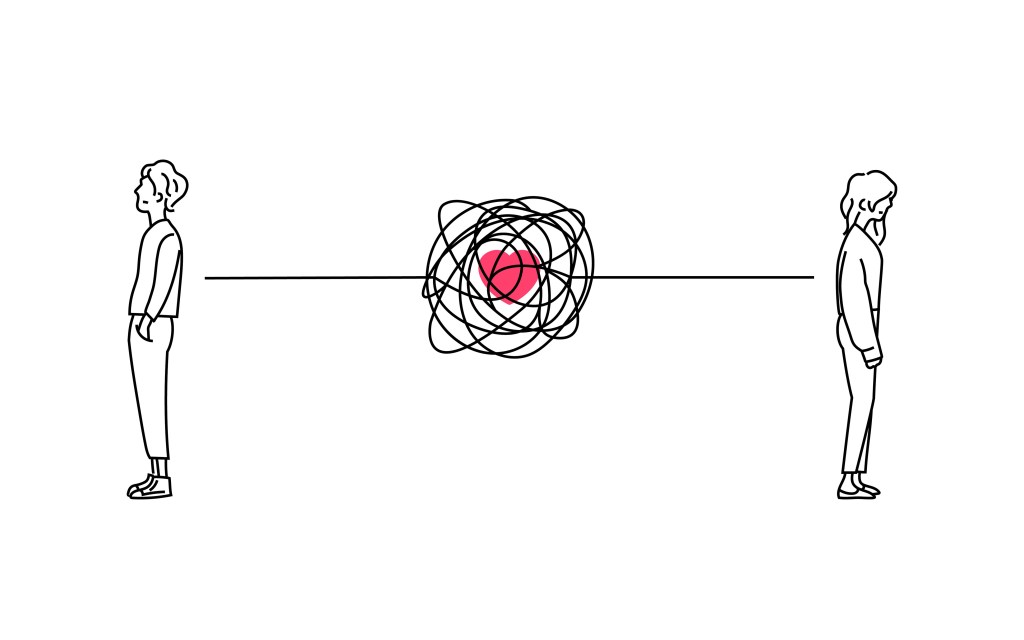No need to hide your pillows or lock up your triangular ruler; the suffocation and triangulation I’m talking about today are less lethal – but can definitely permanently damage your relationship.
Here’s a quick look at ways to spot these relationship habits (in you or your partner) – plus a few quick and easy fixes to start seeing progress in these areas practically overnight.
Suffocation
Every relationship has moments when someone is more needy than usual. Stress of any kind, something that brings up an old unhealed issue. Those are normal in the ebb and flow of relationships.
More dangerous is when you or your beloved have to be together at all times. Have to be doing the same thing, always wanting to know where the other is and what they’re doing or thinking. On the phone together, FaceTime, WhatsApp, texting nonstop, or addicted to the Find my Phone app….
Constant observation and monitoring can quickly turn a relationship into a lab experiment rather than a nurturing experience.

Solution: In his book, “The Prophet,” Kahlil Gibran has a line that has always stuck with me: “Let there be spaces in your togetherness.”
- When you need time to yourself, own it. Declare it. Double check with family scheduling, of course, but this isn’t about asking. It’s about claiming your own personal space. Start every conversation about your plans for time apart with “I love you, and I’m going to…”
- When you’re apart, select a few specific times to check in with each other – but make that contact infrequent. When I go on weekend solo retreats, or spend time with friends, I always touch base with my spouse when I arrive at my destination… and again when I’m getting ready to hit the road home. Time apart creates engaging conversations once you’re back together again.
- Set – and honor – boundaries. If watching NASCAR all afternoon is your beloved’s dream, and you want to curl up on the couch with a good book, plan together to do just that. With ground rules. Just like you must drive counter-clockwise in a NASCAR race, honoring each other’s boundaries is required. No continual “did you see that??” or reading book passages aloud to draw your partner back into “suffocation time.”
Triangulation
We all have moments when we want other people to be “on our side.” We also love being right – which means someone else needs to be wrong. And a third person needs to be a witness to how right we are. Even if all the third-person witnesses are our secondhand side of events.
Triangulation happens anytime you vent your frustrations with another person. Which then of course causes the third person to defend you, join with you… and creates a negative dynamic between this third person and your beloved.
Which of these scenarios sound familiar to you: you complain about your beloved to a family member or friend – and once the issue’s resolved, those third party folks seem to give your beloved the stink-eye or voice their displeasure about them. You complain to your beloved about a family member or friend… and the same thing happens, but this time it’s your beloved who’s no longer warm and fuzzy toward your friends or family.
Solution: Will Bowen, pioneer of the 21-Day Complaint Free World experiment and author of Complaint Free Relationships says complaining in relationships leave us “feeling unfulfilled and inadequate.” If you’d rather be happy than right, try these tips:
- If you have a complaint about someone, take that complaint to that person and bring along several possible ideas of how to resolve the issue. Or talk to a professional who can help you work out possible solutions to whatever’s got you tweaked. Don’t go around telling your story to others with great ego-gusto.
- Examine the “meaning” you’re giving to things your beloved did or said. Pay attention to the actual words or actions. Just the facts. “My beloved left dirty dishes in the sink.” That’s a fact. “My beloved doesn’t care whether our house is neat or not or how much it bothers me to have dirty dishes in the sink. Therefore they don’t care about me.” Not so much facts.
- Look for 50 different reasons why someone may have said or done something that tweaked you. Make at least half of them completely outrageous – like they were hypnotized to always drop their clothes just outside the laundry hamper… or they have electronic-induced amnesia that happens anytime you they agree to do something while they’re staring at a screen.
I’m a sucker for happily-ever-after stories. And I know that healthy relationship skills like these are learned… and always begin with authentic, compassionate conversations. If you’d like to enhance your skills AND save money in the process… Visit https://paulalangguthryan.com/services/ to see if working together will benefit you.
Use LOVEGROWS22 Coupon Code and get 75% off every hour you book!
Paula Langguth Ryan created the serious and silly RomantiCom seminars, and wrote the super helpful relationship book “Manifest the Perfect Mate: Find the Love & Respect You Desire” (G&D Media, 2021)




